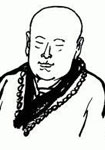“世事花上尘”的意思及全诗出处和翻译赏析
“世事花上尘”全诗
为高皎皎姿,及爱苍苍岭。
果见栖禅子,潺湲灌真顶。
积疑一念破,澄息万缘静。
世事花上尘,惠心空中境。
清闲诱我性,遂使肠虑屏。
许共林客游,欲从山王请。
木栖无名树,水汲忘机井。
持此一日高,未肯谢箕颍。
夕霁山态好,空月生俄顷。
识妙聆细泉,悟深涤清茗。
此心谁得失,笑向西林永。
分类:
作者简介(皎然)

皎然,唐代诗僧。生卒年不详。俗姓谢,字清昼,吴兴(浙江省湖州市)人。南朝谢灵运十世孙。活动于大历、贞元年间,有诗名。他的《诗式》为当时诗格一类作品中较有价值的一部。其诗清丽闲淡,多为赠答送别、山水游赏之作。
《白云上人精舍寻杼山禅师兼示崔子向何山道上人》皎然 翻译、赏析和诗意
白云上人精舍寻杼山禅师兼示崔子向何山道上
望远涉寒水,怀人在幽境。
Longing for a distant place, crossing the cold water, thinking of someone in a secluded land.
为高皎皎姿,及爱苍苍岭。
For the bright and lofty appearance, and the love of the vast mountains.
果见栖禅子,潺湲灌真顶。
Finally, I see the hermit, his presence soothing like flowing water, nourishing the true summit.
积疑一念破,澄息万缘静。
With accumulated doubts shattered, all worldly ties are quieted, leaving only calmness.
世事花上尘,惠心空中境。
Worldly affairs are like dust on flowers, the benevolent heart transcends the mundane realm.
清闲诱我性,遂使肠虑屏。
The tranquility entices my nature, dispelling all worldly worries.
许共林客游,欲从山王请。
I agree to accompany the forest friends and explore, intending to pay a visit to the mountain king.
木栖无名树,水汲忘机井。
The tree in seclusion has no name, and the water from the well eradicates all worldly concerns.
持此一日高,未肯谢箕颍。
Holding onto this elevated state for a day, unwilling to leave this blissful state.
夕霁山态好,空月生俄顷。
In the evening, the mountain's appearance is beautiful, and the empty moon rises momentarily.
识妙聆细泉,悟深涤清茗。
Recognizing the wonder and listening to the subtle springs, understanding the depth and cleansing the tea.
此心谁得失,笑向西林永。
Whose heart gains or loses, I smile towards the eternal Western Forest.
诗意和赏析:
这首诗是皎然对禅修和山水诗的一种表达。诗人追求远离尘嚣,寻找内心的安宁和澄明。他描述了自己置身在寂静的山水间,远眺远方,想念着他在异地的挚友。诗人赞美了山川的高远和宁静,将其与心灵的境界相合,希望以此消除内心的疑惑和困扰。他还表达了在这种清净的环境中,他的思绪变得开阔、平静,能够体验到深度的禅悟和内心的洗涤。最后,诗人提到了他无法割舍这种境界,愿意与同样追求清净的友人一起游山,享受这种心灵的贞洁,笑看世间的得与失。整首诗通过描绘山水、表达内心追求和反思人生,展示了唐代文人对自然与心灵之间的积极互动的关注。
“世事花上尘”全诗拼音读音对照参考
bái yún shàng rén jīng shè xún zhù shān chán shī jiān shì cuī zi xiàng hé shān dào shàng rén
白云上人精舍寻杼山禅师兼示崔子向何山道上人
wàng yuǎn shè hán shuǐ, huái rén zài yōu jìng.
望远涉寒水,怀人在幽境。
wèi gāo jiǎo jiǎo zī, jí ài cāng cāng lǐng.
为高皎皎姿,及爱苍苍岭。
guǒ jiàn qī chán zi, chán yuán guàn zhēn dǐng.
果见栖禅子,潺湲灌真顶。
jī yí yī niàn pò, chéng xī wàn yuán jìng.
积疑一念破,澄息万缘静。
shì shì huā shàng chén, huì xīn kōng zhōng jìng.
世事花上尘,惠心空中境。
qīng xián yòu wǒ xìng, suì shǐ cháng lǜ píng.
清闲诱我性,遂使肠虑屏。
xǔ gòng lín kè yóu, yù cóng shān wáng qǐng.
许共林客游,欲从山王请。
mù qī wú míng shù, shuǐ jí wàng jī jǐng.
木栖无名树,水汲忘机井。
chí cǐ yī rì gāo, wèi kěn xiè jī yǐng.
持此一日高,未肯谢箕颍。
xī jì shān tài hǎo, kōng yuè shēng é qǐng.
夕霁山态好,空月生俄顷。
shí miào líng xì quán, wù shēn dí qīng míng.
识妙聆细泉,悟深涤清茗。
cǐ xīn shuí dé shī, xiào xiàng xī lín yǒng.
此心谁得失,笑向西林永。
“世事花上尘”平仄韵脚
平仄:仄仄平仄平
韵脚:(平韵) 上平十一真 * 平仄拼音来自网络,仅供参考;诗句韵脚有多个的时候,对比全诗即可判断。